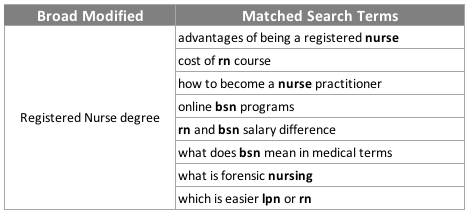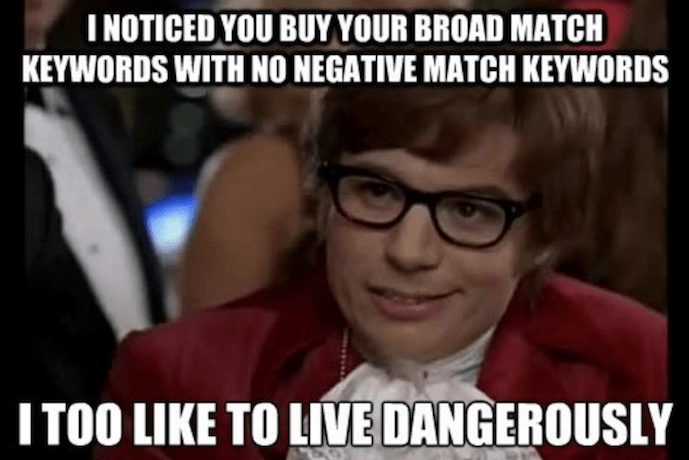How to Utilize Different Match Types in Paid Search

With Pay Per Click, keywords are the foundation of our industry. By knowing how the different type of keywords work and how to utilize these match types, you will be able to reduce some unwanted clicks and some wasted spend. We are going to list out the available match types and real-life Search Query Report (SQR) example and why you might want to incorporate this type of keyword into your accounts.
Exact Match
The name says it all, with this type of keyword, the keyword is triggered by a search query that is exactly what you want to bid on. For example below is the keyword I have in one of my accounts, and it triggers very specific queries. This match type gives you the most control of when your ad will appear and often will have a higher click-through rate.

You might have noticed in my above example, there are two queries and they differ very slightly. This is because the exact match will also pick up close variants of your keywords. To eliminate a lot of redundant keywords in your ad groups, Google will have your exact match keyword pick up:
- Misspellings
- Singular or Plural forms
- Abbreviations
- Reorder of your words
For more information about close variants, here is the Google Page that discusses all of the variants for exact.
Phrase Match
This type of keyword type is similar to Exact Match close variant. It will pick up search queries with your keyword in them, but it may have additional words before and after your keyword. In the example below, the bolded text shows how my keyword exists in the search query from my recent SQR.

In this example, this match type picked up a lot of our competitors’ keywords, so our ads were able to appear alongside their ads without us having to bid on competitor brands. For one of my current accounts, we are only using Exact and Phrase match keywords because the account has a tight budget and an aggressive lead goal. Because of this, we use the most relevant match types as possible to get the most out of our monthly budget. If you have any doubts about why you would have Phrase match in your account, Michael Knight’s blog “When You Need To Have The Right Words Use Phrase Match” made me a Phrase match believer. Before reading his blog I was an Exact and Broad Match Modified marketer and now I use Phrase match on all of my accounts.
Broad Match
So we mentioned Exact and Phrase and how they have higher relevant search queries, but there is a reason for Broad Match to exist in your account. By having this keyword type, you will trigger a lot of different search queries and you will find new keywords to add in your account. How Broad keywords work is they will trigger your ad when a search query contains any:
- Synonyms
- Misspellings
- Singular or Plural forms
- Stemming (verb tenses)
- Related Searches
- Additional words in the Search Query
When you have this type of keyword in your account, you have to maintain a healthy Search Query Reporting habit. Pull reports to make sure that the keywords you have in your account are pulling queries that benefit your client. Below is an example of what queries were triggered by just one keyword.

In this example, the words that are highlighted are all related to the “Nurse” part of my keyword. Some of these queries have great potential as their own keyword, and I can add those queries into my account. As mentioned before, you need to be careful with Broad match and keep your eye on spend and relevance. Certain channels will trigger queries differently and I have found in my own experience that Bing can be a bit liberal with what search queries trigger my ads. Pull SQRs, it could save you spend!
[bctt tweet=”Pull SQRs, it could save you spend!” username=”DianeChelius”]
Broad Match Modifiers
If you like the idea of using Broad match but slightly intimidated by what might come through your SQRs, you can test out Broad Match Modifiers. This type of keyword is still Broad but you are putting parameters on your keywords that must be in the search query to trigger your ad. In the example below, every part of the keyword is in the search query, it just may be in a different order or part of the keyword has a different stem.

With this type of Broad match keyword, you are still opening yourself to traffic and long-tailed keywords. By putting parameters in place and with frequent SQRs, you will be able to tell if you want to continue bidding on this type of traffic.
Negative Keywords
All of the above keywords are about how to get your keyword to trigger your ad, but Negative is the opposite. By incorporating Negatives into your account you are stating when you do not what to appear in the auction. In my Broad match example, I could add some of the queries as a negative to prevent a similar query from appearing the next time around. My client is a school, and they may not want to spend their clicks on people investigating salaries or forensic nursing if that course is not available. I would then add salary and forensics as a negative keyword to remove future queries from occurring.

Conclusion
I know we ended on a Negative, but by utilizing different match types in your account you can have very positive results! With Exact and Phrase you can keep tighter control on what type of queries trigger your ads, while with Broad and Broad Match Modified you can find new keywords to add to your account as a new keyword or as a Negative keyword. If you want to learn more about how to have an account segmented by Match type, Kirk Williams previously wrote “Here’s Why You Should Separate Match Types By Ad Group” to help you learn how to get the most out of your match types with a strong account structure.



